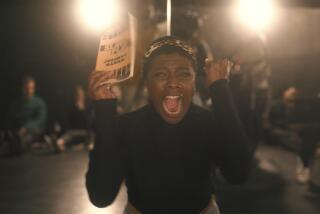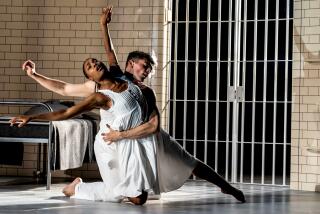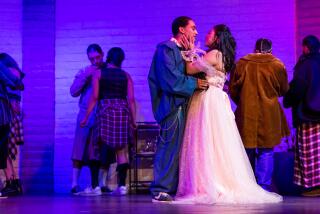Talk Burdens ‘Rome and Jewels’
The great moments in “Rome and Jewels” at UCLA on Friday came when three inspired onstage DJs (Miz, Cisum and Evil Tracy) set up a visceral web of rhythms and counter-rhythms while the dancers of Rennie Harris’ Puremovement company moved with enough devastating heat--and cool--to turn the whole Schoenberg Hall audience into what the text called “wannabe hip-hop junkies.”
Unfortunately, such moments of glory were crammed between gaseous verbal harangues, starting with the one in which director-choreographer Harris asked the audience to “drop your expectations” but then proceeded to set up inflated expectations about his dance drama’s spiritual meaning--expectations that the two-hour presentation never justified.
In moving “Romeo and Juliet” to the streets of Philadelphia, Harris took major risks: making Jewels (Juliet) an invisible presence, talked to but unseen, for instance. Or taking the plot only up to the deaths of Merc (Mercutio) and Tibault (Tybalt): Shakespeare’s Act 3, Scene 1. But his biggest risk involved marginalizing what he does best: choreography.
Using different hip-hop styles to distinguish his two casually warring gangs--the Monster Qs (Montagues) and the Caps (Capulets)--he provided a spectacular anthology of assaultive, athletic street dance, one culminating in the extended dance-off between the Qs and Caps just before the final carnage. But with twice as much talk as “West Side Story” (not counting the rap lyrics), “Rome and Jewels” never allowed dance to tell its story or define its characters. And only once, in a gymnastic morning-after solo for Rome (Romeo), did Harris use movement to explore his characters’ individual emotions.
With Puremovement largely relegated to pure diversion, the story and characters emerged from an uneven text credited to Shakespeare, Harris, Rodney Mason, Ozzie Jones, Sabela Grimes and Raphael Williams. Imbalances reigned, with Merc (Clyde Evans Jr.) having virtually nothing to do as a character but die (robbing his death of the impact it achieves in every other retelling), but a corps dancer (Duane Holland) with no assigned character name dominating nearly all the Qs ensembles with his gymnastic feats.
Sometimes the text settled for the same obvious comic playoffs between British rhetoric and black slang that fueled such vintage entertainments as “The Hot Mikado.” Elsewhere, however, it created its own inclusive style of theatrical speech, so that Rome (Romeo) could bounce with equal ease between pithy interchanges with his squad, a Shakespeare sonnet (No. 18: “Shall I compare thee to a summer’s day?”) and even an impersonation of John Travolta in “Grease.”
Framed by chain-link fences, with Howard Goldkrantz’s impressionistic video projections as a moving backdrop, “Rome and Jewels” presented itself as contemporary black folk theater, embellished and somewhat deepened by its dances but essentially as sex-obsessed as all those low-comedy passages in “Romeo and Juliet” that your high school English teacher told you to skip.
As a tale of what it called “star-cross’d homies,” it depended heavily on the audience identifying with the tireless Rodney Mason as the streetwise Rome, though the script and staging didn’t allow his character to see Jewels as more than the ideal solution to his sexual needs--or get much deeper than morose consternation when confronting the catastrophe he brought on the Qs and Caps in the final scene.
But even if the character never moves on spiritually by challenging reality--the expectations that Harris created in his opening speech--he guided us through the “Rome and Jewels” experience deftly and never fell into obnoxious preaching a la Sabela Grimes as Ben V (Benvolio) or Forrest “Getemgump” Webb, as an omnibus character who inherited a version of the prince’s final speech about pardon and punishment.
Ron Wood proved unexpectedly thoughtful as Tibault, normally Juliet’s cousin but here Jewels’ boyfriend. Other versatile exponents of Puremovement included Leslie Rivera, Brandon Albright, Jules Urich, James “Cricket” Colter and Ozzie Jones as MC. Christina Choe served as videographer and Pamela Hobson contributed the bold lighting design.
* Rennie Harris Puremovement performs “Rome and Jewels” Saturday at 8 p.m. in the Carpenter Performing Arts Center, 6200 Atherton St., Long Beach. $18-$23. (562) 985-7000.
More to Read
The biggest entertainment stories
Get our big stories about Hollywood, film, television, music, arts, culture and more right in your inbox as soon as they publish.
You may occasionally receive promotional content from the Los Angeles Times.










